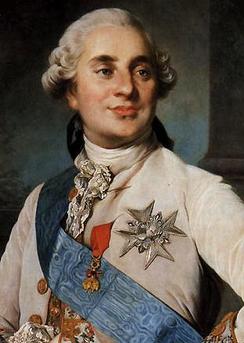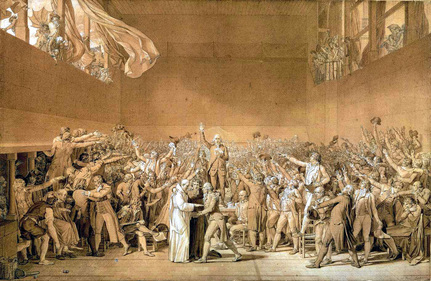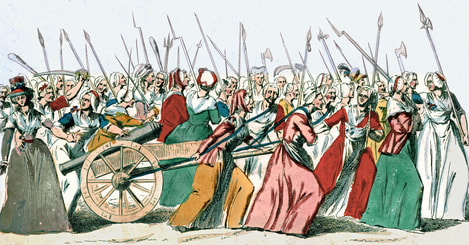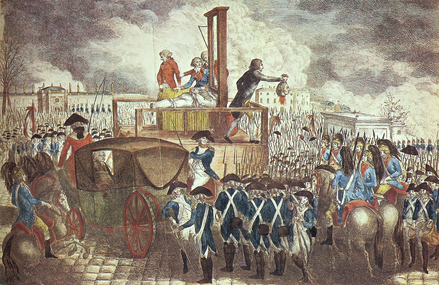LOUIS XVI
|
One of the most important figures of the French Revolution was Louis XVI. He was born on August 23rd, 1754 as Louis-Auguste at the Palace of Versailles in France. His father was Louis XV of France and the heir to the French throne. Louis XVI, who belonged to the Royal House of Bourbon, became King of France in 1774 when his grandfather Louis XV died. Louis XVI father was the next in line to the French throne but he died in 1765.
In 1770, at the age of fifteen, Louis XVI married Marie Antoinette, the fourteen year old daughter of the Emperor and Empress of Austria. The marriage was arranged to strengthen the alliance between France and Austria. Upon her marriage to Louis she became the Dauphine of France. The personalities of Louis XVI and Marie Antoinette differed tremendously. Louis XVI was introverted, shy and indecisive. As well, he enjoyed solitary activities, such as: reading and metalwork. Whereas, she was outgoing and craved social encounters such as parties. |
At the beginning of Louis XVI’s reign, France was under the Ancien Regime which was a system based on absolute monarchy and the feudal traditions of the estates system. The Age of Enlightenment, which had been occurring throughout the 1700’s began to introduce ideas to people in Europe that opposed these principles and were instead based on liberty and equality. The spreading ideas of the Enlightenment would eventually lead to the outbreak of the French Revolution, which would ultimately result in the end of the French monarchy and the death of Louis XVI.
Louis XVI’s downfall was also caused by the economic crisis that faced France throughout the late 1700’s. For example, during the American War of Independence against Britain, France allied itself with the United States and helped support the American war efforts. Louis XVI’s support of the war was expensive and caused the country to push itself into bankruptcy. This action by Louis XVI proved costly, as his decision to assist in the war would eventually cause him to face a financial crisis in his own country as the treasury of France was drained. As France slipped into crisis, Louis XVI tried to solve the country’s financial woes by forcing increased tax rates on the citizens, including new taxes for the nobility. However, he did not anticipate the consequences of this decision as the French nobility worked to block his plans and the third estate’s anger with the absolute monarchy of the king grew more intense.
The peasants of the third estate resented the wealth and privilege of the king and queen and viewed the cost of the monarchy as expensive and wasteful, while they suffered under the estates system. As well, rumors of the expenses of the royal family, especially Marie Antoinette, created anger among the working class and helped spark the violence of the revolution.
The peasants of the third estate resented the wealth and privilege of the king and queen and viewed the cost of the monarchy as expensive and wasteful, while they suffered under the estates system. As well, rumors of the expenses of the royal family, especially Marie Antoinette, created anger among the working class and helped spark the violence of the revolution.
In order to try to solve the crisis, Louis XVI called the Estates-General in May of 1789. The Estates-General was a meeting of the three estates within French society which included the clergy, nobility and the peasant classes. Louis XVI’s ministers, including the popular Jacques Necker, spoke about the financial situation facing the country but the meeting was doomed as the representatives of the three estates could not decide how to carry out the vote. Eventually, the members of the third estate left the Estates-General and took the Tennis Court Oath. Next, angry Parisians stormed the Bastille, a prison fortress that, for the working class, represented the authority of the king. Louis did not recognize the significance of the storming of the Bastille and failed to respond to the early stages of the French Revolution. In fact, he and his family left Paris at this time and went to the Palace of Versailles, which led to the next major event of the French Revolution.
On the 5th of October 1789, the group of working class women were protesting the price of bread and on the 6th of October they marched from Paris to Versailles to confront the king. Upon arriving, the women killed several of the king’s guards, putting their severed heads on pikes, and forced the royal family to return to Paris with them. In particular, the women were angered with the king’s failure to respond to the financial hardships facing the citizens of the third estate.
On the 5th of October 1789, the group of working class women were protesting the price of bread and on the 6th of October they marched from Paris to Versailles to confront the king. Upon arriving, the women killed several of the king’s guards, putting their severed heads on pikes, and forced the royal family to return to Paris with them. In particular, the women were angered with the king’s failure to respond to the financial hardships facing the citizens of the third estate.
Returned to Paris, Louis XVI and his wife Marie Antoinette were held prisoners in the Tuileries Palace, while the revolutionaries transformed the country. The National Assembly had passed the Declaration of the Rights of Man and of the Citizen which had limited the authority of king. Seeing his power dwindled, and fearing the continued growth of the revolutionaries, Louis XVI and his family attempted to flee the country.
On the night of June 20th, 1791, Louis XVI, Marie Antoinette and their children fled the Tuileries Palace to try to make it to Austria, in order to gather support from Marie Antoinette’s country of birth. The royal family had been held prisoners in the palace after a mob of Parisian working class women forced the royals to return to Paris from the Palace of Versailles. Louis XVI, Marie Antoinette and their children snuck out of the palace in Paris disguised as servants and took a carriage throughout the French countryside towards France’s border with Austria. Louis XVI had hoped to arrive in Austria and spark a counter-revolutionary movement among France’s neighboring countries in order to retake control over the country.
When the carriage arrived in the small French town of Varennes, it was stopped by a town official and the royal family was recognized. Louis XVI had hoped the peasants outside of Paris would still support him and the monarchy that he represented but he was mistaken. Peasants all across France were struggling under his rule and sided with the revolution more than with Louis XVI. The revolutionaries forced Louis XVI and his family to return to Paris and removed the little remaining authority he still had. Louis XVI was, from that point on, viewed as a traitor to the revolution. In fact, the attempt to flee by the royal family removed any remaining respect that the citizens of France had for the king, and the French people now felt betrayed. The failed attempt to flee would also be important in the eventual execution of Louis XVI.
When the carriage arrived in the small French town of Varennes, it was stopped by a town official and the royal family was recognized. Louis XVI had hoped the peasants outside of Paris would still support him and the monarchy that he represented but he was mistaken. Peasants all across France were struggling under his rule and sided with the revolution more than with Louis XVI. The revolutionaries forced Louis XVI and his family to return to Paris and removed the little remaining authority he still had. Louis XVI was, from that point on, viewed as a traitor to the revolution. In fact, the attempt to flee by the royal family removed any remaining respect that the citizens of France had for the king, and the French people now felt betrayed. The failed attempt to flee would also be important in the eventual execution of Louis XVI.
|
On December 11th, 1792, the king was brought before the convention to hear the charges against him. He was charged with treason due to his attempt to flee the country, which was viewed as him abandoning his country. Next, on January 15th, 1793, the representatives voted and passed their verdict of guilty. The famous revolutionary, Maximilien Robespierre, commented that “Louis must die so the nation may live.” Louis’ punishment was death and on, January 21st, 1793, he was beheaded by guillotine. His final words were said to be: “I pardon those who are the cause of my death and declare myself innocent of all of the charges brought against me.” The French monarchy, which had lasted for over 1000 years, was over.
|
CITE THIS ARTICLEAUTHOR
|
|




